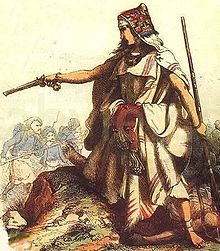Lalla Fatma N'Soumer
Lalla Fatma N'Soumer or Lalla Faddma N'Soumer ( Tifinagh script : ⴼⴰⴹⵎⴰ ⵏ ⵙⵓⵎⵔ ; Arabic لالة فاطمة نسومر; born 1830 ; died September 1863 ) was an Algerian resistance fighter against the French colonial power .
Life
She was instrumental in the war against the French when they conquered Algeria. She led troops in her home region, Kabylia , the last region to defend itself against the French. When Bou Baghla died in fighting against the French in 1854, she was elected the new leader of the Kabyle resistance movement. Numerous guerrilla attacks on French troops were under her pen. On May 24, 1857, she and her troops were defeated by the French. Under Jacques-Louis Randon , troops of 45,000 soldiers were used against the Kabyle resistance and N'Soumer's troops were powerless against the more modern weapons of the French.
She was arrested along with 200 other women and children and taken to a detention center in Beni Slimane . Six years later, at the age of 33, she died of inflammation that caused her leg to become swollen and paralyzed.

meaning
Since the independence of Algeria, N'Soumer has been considered a national heroine and is revered for her courage, wisdom and strength. The feminist movement of Algeria relies on them; the feminist organization Tharwa Nfatma N'Soumer (daughters of Fatma N'Soumer) is named after her.
In a 2014 film adaptation of her life, the French actress Laëtitia Eïdo played the role of Lalla Fatma N'Soumer.
Several streets and schools in Algeria are named after her. Several monuments are in her honor.
Individual evidence
- ^ A b Hares Sayed: War, Violence, Terrorism, and Our Present World: A Timeline of Modern Politics . Xlibris Corporation, 2017.
- ↑ a b c Zahia Smail Salhi: Nsoumer, Lalla Fatma . In: Emmanuel Kwaku Akyeampong, Henry Louis Gates, Steven J. Niven (Eds.): Dictionary of African Biography . 2012, p. 497 .
- ↑ Fadhma N'Soumer. Retrieved March 16, 2020 .
| personal data | |
|---|---|
| SURNAME | N'Soumer, Lalla Fatma |
| BRIEF DESCRIPTION | Algerian resistance fighter |
| DATE OF BIRTH | 1830 |
| DATE OF DEATH | September 1863 |
